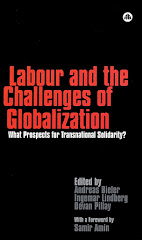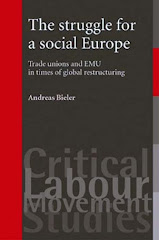The
public sector in the UK is under attack across the board. Tuition fees and
marketisation in Higher Education, the abolition of the Education Maintenance
Allowance in Further Education, moves towards privatising parts of the NHS, the
transformation of schools into academies, cuts in disability benefits, the list
could go on. Since 1 April this year, a second round of draconian cuts have
been implemented damaging especially the weakest members of society (for an
overview, see BBC News, 15
April 2013). And yet, resistance is fragmented and weak. A coherent, united
movement against austerity has not emerged in the UK. On 18 May 2013, a People’s Assembly Against Austerity
will be held in Nottingham. In this post, I will discuss the importance of
local People’s Assemblies for the revival of resistance to austerity in the UK.
In particular, I will highlight four reasons: (1) the collapse of resistance at
the national level; (2) the importance of a broad space to bring together the
diverse groups and people opposed to austerity; (3) the fact that the impact of
cuts is felt at the local level; and (4) the need to unite various existing
local movements of resistance.
 |
| Photo by Aspex Design |
 |
| Photo by Aspex Design |
Moreover,
it is the local level, where cuts are felt. The closure of a hospital or a
public library, the transformation of local schools into academies, the
restructuring of GP surgeries, these are all changes affecting people directly
in their day to day lives. Unsurprisingly, it is also the local level, where
people are most likely prepared to become involved in activities of resistance.
People’s Assemblies can provide the vehicle to energise these people.
Finally,
local and regional People’s Assemblies can provide the forum for the
co-ordination of the already existing movements against austerity. Importantly,
local initiatives to defend the NHS, against the introduction of academies or
against cuts to disability allowances already exist in many parts of the
country. Frequently, however, they are single issue initiatives. This plays
into the hands of government, which attacks one individual sector after the
other. Local People’s Assemblies can provide the space for these individual
initiatives to compare their analyses and to prepare joint activities. After
all, austerity, restructuring and privatization are behind the attacks on all
the various areas of the public sector, and while individual government
policies may differ significantly, the underlying rationale is the same. Ever
larger parts of the public sector are restructured and opened up to private
capital. Local People’s Assemblies provide the opportunity to bring these
individual initiatives together into one more coherent voice of opposition,
able to contest austerity successfully.
Of
course, local People’s Assemblies in themselves will not solve the problem.
National co-ordination is required to fight back at the level of government.
Local People’s Assemblies can, however, provide the necessary pressure on
national trade union leaders and other movements to spring into action and
provide the leadership against austerity this country and its people deserve.














For the excellent article 'Peoples Assembly : what can it deliver?' by Charlie Kimber, see http://www.socialistreview.org.uk/article.php?articlenumber=12323
ReplyDelete